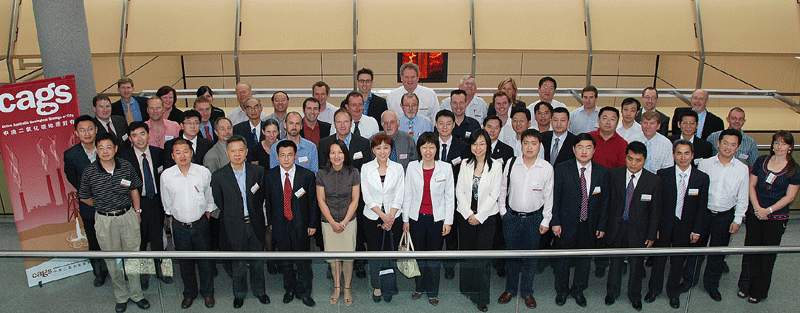The first CAGS technical workshop on geological storage of CO2 was hosted at Geoscience Australia in Canberra from the 19th to 21st of January 2010, followed by field trip to Canowindra for international participants on the 22nd January 2010.
This workshop's aims were to:

CAGS workshop 1 participants
More than 60 delegates from China, Australia, the UK and USA participated in the workshop. Selected participants were invited to share their knowledge and experience through presentations. Participants from China included: ACCA21 (MOST); the Institutes of Rock and Soil Mechanics and Geology and Geophysics from the Chinese Academy of Sciences; the Chinese Geological Survey; the China University of Petroleum; Tsinghua University; Shengli Power Plant; Chinese University of Geosciences; and Sinopec. Australian and international participants included: Geoscience Australia; Department of Resources, Energy and Tourism; CO2CRC; CSIRO; CO2 Geological Storage Solutions; Geoscience Victoria; Geological Survey of Queensland; Australian School of Petroleum; University of New South Wales; Global CCS Institute; Gulf Coast Carbon Centre, University of Texas; Pacific Northwest National Laboratory USA; British Geological Survey; Chevron; ZeroGen.
The workshop was divided into eight sessions covering aspects of geological storage of CO2 including assessment of the prospectivity and capacity for storage at various scales, policy and communication issues, risk assessment, and updates on research and projects in China, Australia, the USA, and UK. Participants were encouraged to contribute to robust discussions which addressed topics including approaches to regional assessment and methodology and the next steps for getting storage ready).
A survey was conducted at the end of the workshop to obtain feedback from participants regarding the success of the workshop and suggestions for future events. Feedback from participants (both formal and informal) was overall very positive, with many praising the program, the organisation, and the participants. Chinese participants were particularly appreciative of the chance to network with representatives of other Chinese organisations that they have not had much contact with in the past. Many of the non-Chinese participants indicated their interest in continuing an association with CAGS in the future, which was a very positive outcome.